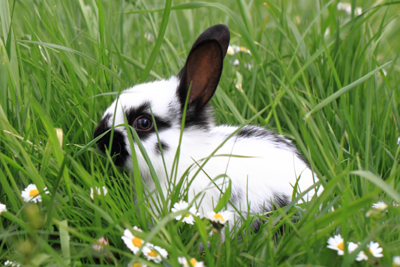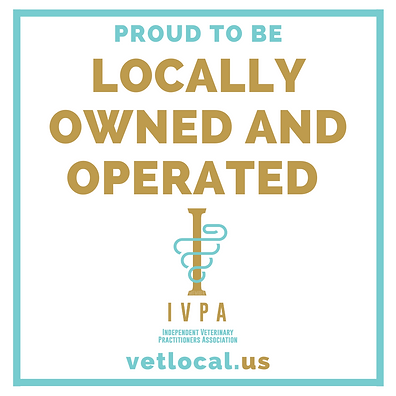|
Priest Lake Veterinary Hospital is proud to be able to offer advanced surgical procedures in rabbits. Your Nashville Vet also has an agreement with NVS (Nashville Vet Specialists) to have advanced imaging (CTs) preformed on any rabbit that requires one.
If your rabbit is suffering from ear disease, dental disease, chronic snuffles or any other disease, please call today to schedule an appointment with Dr. Kopp!

"After cats and dogs, rabbits are the species most often surrendered to animal shelters," according to the Humane Society of the United States. "Most rabbits lose their homes because of "people reasons," such as a move or the owner's inability or unwillingness to care for the animal, not because the rabbit has behavioral or health problems.”
If you are considering adopting a rabbit, your Antioch vet will help you learn how to provide great care, and meet nutritional, medicine and exercise needs. You will also need to bunny-proof your living space and yard, and establish a veterinarian relationship with your Nashville exotic vet so you can ask for help regarding husbandry, socialization, diet, and new rabbit information.
But, which pet store is the best place to purchase your bunny?
It is not ideal to purchase your cotton-tailed friend from a mass-breeding facility or pet store that supports or encourages mass breeding.
You'll want to check with local animal shelters, rabbit rescue groups, local veterinarians for rabbits in need of a good home. After looking into those options, you will want to contact breeders for help and information in your bunny search. Animal shelters, rescue groups, veterinarians and breeders all have different roles in helping surrendered/homeless rabbits so always look where you can. With enough research and diligent efforts, you will find the best bunny match for your family’s needs, considerations and care requirements.
Remember that many bunnies that lose their homes are surrendered to local animal shelters. Oftentimes, representatives from rescue and adoption agencies will rescue rabbits directly from animal shelters and continue their care until homes are found. Workers and volunteers at rescue and adoption agencies are knowledgeable and highly attuned to rabbit requirements, overall needs and wellness issues. They and your exotic veterinarian in Nashville can be an excellent source of information during your rabbit search.
Always meet with veterinarians in your local area especially your rabbit vet in Nashville, Tennessee. Some may have treated rabbits and may know of rabbits needing a good home. When you check with breeders, you'll want to make sure their business is rabbit breeding and meets certain standards.
The United States Humane Society suggests guidelines for visits to a commercial breeder:
- Look for rabbits that seem healthy, happy and living in clean areas that are well maintained and have adequate lighting. This includes the breeder's own home environment.
- Ask the breeder about their relationship with the local veterinarian. The breeder should be able - and willing - to provide you with references and records that relate to the care of rabbits in their care.
- Always get a written contract that ensures your new rabbit's health. Read the contract before signing it, ask questions and double-check that you are able to use your Nashville rabbit veterinarian for your new pet.
- Pay attention to the questions breeder's ask about you. They should be interviewing you, as you are interviewing them, about the home and care you will provide for your new rabbit. This ensures that they, too, want the best for the rabbit.
- Check out the location your new rabbit was born and raised in.
- Ask the breeder about common genetic problems. They should be able to talk with you and be knowledgeable about any problems.
- Ensure that the breeder will be willing to help you create a great home for the rabbit you select and continue to be a resource for you throughout the rabbit's lifetime.
Think again -are you ready, now, for your new pet rabbit? Are you able and willing to care for it? Good luck with your new fluffy friend.
As small mammal veterinarians, we provide primary and emergency care for your pet rabbit including:
- Annual exams with nutrition and husbandry consultation,
- Primary care appointments,
- Nail trims,
- Routine and emergency dental exams and filings.
- Vaccination against RHDV2 (Rabbit Hemorrhagic Disease 2)
Here are some of our guidelines of basic care for your pet rabbit.

Diet
Your rabbit exotic vet believes the main component of your rabbit’s diet should be clean, fresh timothy hay. Limited amounts of pellets and vegetables should be added to the hay. Stay away from giving foods high in sugar and starch, including fruits, nuts, yogurt drops, seed sticks, and cereals. Sugary foods can cause a fatal overgrowth of harmful bacteria in your rabbit’s digestive tract.
Hay: hay should be available at all times. Your bunny vet says there is no maximum amount of hay to be offered to a bunny, as increased amounts will help with digestion as well as maintenance of dental health. Hay is an excellent source of fiber and helps to reduce possible intestinal blockages by increasing movement of contents within the digestive system. Do not offer Alfalfa hay, which is high in calories and calcium which can lead to bladder stones. Look for hay that is an overall green in color and that has a fresh sweet smell. If the hay is brown, dusty, or smells moldy, your antioch exotic veterinarian recommends you do not feed it to your rabbit.
Pellets: give about 1 tablespoon of pellets for every 2 pounds of body weight. Look for a good quality timothy hay based pellet (NOT alfalfa hay based). Be sure the ingredient list does not contain seeds, corn, nuts, fruit, crunchy or colored bits. The amount of pellets offered is restricted to prevent obesity, a common problem.
Vegetables: Dark leafy greens (i.e. romaine lettuce, arugula), leafy vegetables (i.e., carrot tops, cilantro, wheatgrass), and a small amount of vegetables (i.e. bell peppers, zucchini); essential for balanced diet. Offer only small amounts of kale, collards, parsley, mustard greens, dandelion greens, and spinach, they are also high in calcium, or oxalic acid. Avoid beans and rhubarb.
You can find a list of good veggies from Rabbit.Org or Rabbit Welfare Association and Fund
Fruits: Fruits are considered a treat and should be offered no more than a couple of teaspoons per day. They should be given in tiny pieces.. Some suggested fruits are apples (without stems or seeds), papaya, banana, pear, nectarines. Fruit snacks are great for training your bunny or to offer when you put him back in his enclosure after some play time.
Provide fresh water in a water bottle. Check regularly to make sure the ball at the end of the sipper is not stuck.
When transitioning a pet rabbit to a more appropriate diet, gradually increase new foods. Monitor for any adverse side effects such as lack of stool or appetite. If this happens, contact your veterinarian immediately.
Health
Rabbits have a very interesting digestive system that is different from human’s. Their tract includes an additional stop between the small and large intestines, called the cecum. The cecum ferments digestible fiber into cecotropes, also called “night feces.” Rabbits will ingest the night feces immediately due to a process called coprophagia, which is critical for maintenance of healthy intestines. Then any undigested fiber is passed during the day as normal feces.
Your bunny veterinarian in Nashville Tennessee knows that diarrhea is considered an emergency in rabbits. Contact your Nashville rabbit veterinarian immediately, also if you notice lack of appetite or lack or stools.
|
.webp)







